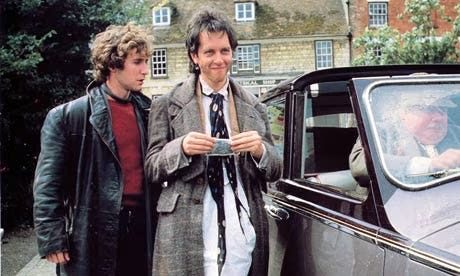This piece was first published by the Republic of Letters (April 2025).
“You see, the thing about Geoff, is that he doesn’t really do plot.” Or so says Geoff Dyer’s literary agent — a fleetingly minor character in Out of Sheer Rage, Dyer’s account of his failed attempt to write a study of D.H. Lawrence. Or at least I think she says it. I used to have two copies in the house, but I’ve given them both away. And I gave up on a last-minute attempt to listen to the audiobook at 2.2x speed at about the 30 minute (or, more precisely, 66 minute) mark. So I may have imagined it.
Fittingly, it’s that slipperiness — and the honesty beneath it — that defines Dyer’s work. Born in Cheltenham in 1958, he won a scholarship to a grammar school, then spent three years at Oxford. Next came life on the dole in 1980s London, the kind that makes the characters in Withnail and I look like management consultants. In 1989, he published The Colour of Memory, his first novel — a book about three Brixton dossers attempting to live creative lives. “It was as though getting a job was a temporary illness from which I had now recovered.” Write what you know, and all that.
One of my favourite clichés about writers is that they only ever have one novel in them and that their life’s work is just an attempt to write ever-better versions of it. Dyer is the best argument against this. In a career spanning 21 books, he’s written more widely than perhaps any living writer. From a quasi-biographical series of vignettes about jazz musicians, to a reworking of Death in Venice where Gustav von Aschenbach is replaced by art journalist and “high-quality freeload[er]” Junket Jeff, to his most recent work: a meditation on endings, ageing, and (ostensibly) Roger Federer’s tennis career.
The result is a library of cover quotes most writers would kill for. Zadie Smith’s (“a national treasure”) gets rolled out regularly, as does Steve Martin’s (“the funniest book I’ve ever read”). His is a career of stealth importance. Dyer is rarely cited as an influence, but it’s hard to read Ben Lerner, Sheila Heti, or even Elif Batuman without noticing echoes of Dyer somewhere.
Part of what makes Dyer such a rare figure — what marks him as a true literary man — is the way he combines seeming opposites. There’s always been a touch of the bloke about him — look at the cover and blurbs of some of his books, and like Junket Jeff himself, you might be forgiven for thinking Dyer a writer “more FHM than TLS.” But pick up any of his books, and you’re quickly disabused of the idea that his lightness of spirit comes from a lightness of intellect.
The biggest clue comes early: the epigraphs. Roberto Calasso. G.C. Waldrep. Anita Brookner. The Goncourt Brothers. Every time you open a Dyer book, it’s a gateway to a Wikipedia rabbit hole, followed by a swift trip to the lesser explored corners of Amazon. Even Dyer’s mask of self-deprecation slips when it comes to them: “Whatever people say about my books — and it always amazes me when people don’t like them, but sometimes they don’t — the epigraphs have always been top-drawer.”
So here we have one of the rare, and possibly vanishing, figures in artistic life: a true literary man. What might we learn from him?
Let's start with where Dyer’s success comes from. With such a diverse output, many reviewers simply give up on finding a through-line, throw up their hands, and revert to something like “genre-bending.” For me it’s his sense of fidelity.
There’s never a feeling that a book Dyer has written is anything other than the book he wanted to write, nor that in some way he’s been forced to stop, slow, and do what so many of us do: fear that sentence we’ve just written is a little too much, and hastily deploy the index finger of our right hand. Delete the sentence. Sigh with relief.
The result is a set of genuine, unique, and excellent books, buoyed by a weightlessness that comes only when one finds oneself not bothering to try too hard, and one that elicits a certain kind of response from reviewers. Here, for example, is William Deresiewicz, brilliantly, in a 2012 article for The New Republic:
What I really admire about Geoff Dyer’s work is Geoff Dyer. Here is a man who decided a long time ago that he was going to follow the muse of his own curiosity, let the rest of the world be damned, and by God, he’s made it stick. No institutions, no apologies. A freelance, a vagabond, an aesthete, a latter-day bohemian and man of letters: I call that courage. I also call it culture.
Here, I think, lies the first lesson. As someone who’s attempted a grand total of zero novels in my life, I don’t really feel qualified to opine on this topic in any way, but the one thing I would feel comfortable saying is that what is true is generally good. And what is inauthentic, is generally bad. I would hope Dyer agrees. Here’s him in an interview he gave to The Dublin Review in 2013: “I like to write stuff that is only an inch from life — but all the art is in that inch.”
It’s this inauthenticity that, above all else, I think, has led to the situation detailed by Jacob Savage in his article in Compact Magazine that kicked off the present wave of soul searching, one in which: “Not a single white American man born after 1984 has published a work of literary fiction in The New Yorker.”
Many of Savage’s missing men, I think, are lured off-piste by the temptation of writing what they think an imagined editor, with a very specific worldview, wants to read — rather than what is actually true. This worldview normally gets caricatured by its opponents as ‘woke politics,’ but I think that misses the point entirely. Whether it’s Cusk, Knausgaard, or even, as some have (convincingly) argued Rooney, it’s not like the book industry at large is averse to publishing, and putting serious money behind, writing with a small c-conservative bent — so long as it’s good.
Instead, it’s the inauthenticity that strangles these nascent works in the cradle. Importantly, this generally seeps in not via the big picture, but in the small details. Like a bent copper, it’s the small things that almost start the inexorable decline. The result is that male characters in novels by men cease to feel like real men — less an inch from life, and more a mile. And it’s not just the male reader that notices it, I think, but any reader regardless of gender.
It’s easier, I think, to point to a novel that gets it right than to publicly flag those that don’t. Because when male literary fiction does succeed today, it often succeeds in exactly the register Dyer made his own: small, precise, close to life.
David Szalay’s new book Flesh is a case in point, rightly feted for its portrayal of modern masculinity. Lots of the reviews of the book centre around the usual suspects: the relatively large number of sex scenes in it. Don’t get me wrong, they were excellently realised. But for me, they weren’t the scenes that really landed the novel.
Instead it was the smaller details: the masculinity written in the margins. The button-sized pain in the front of your neck that comes from wearing a shirt and tie fully done up all day. The strange allure of cars: a three-page diversion about the delights of the BMW museum in Munich. The precision in placing the watches that the main character is gifted (an Audemars Piguet Royal Oak and a 1953 Rolex Submariner).
This is the route to great novel writing, and a virtue Dyer shares. It’s not just the sex scenes (“My God, she was radiantly beautiful, high on coke, and fifteen minutes previously, she’d had his hand between her legs while she pissed”), but the small things that punctuate all of Dyer’s novels. The search for a perfect Italian cornetti, a can of coke in a foreign land, or the pain of a trip up the stairs after a game of amateur tennis. It’s real. And good.
The second lesson from Dyer is less about his fidelity to the world, but to writing itself.
This, I think, presents us with the most direct answer to the question: where have all the literary men gone? In fact, they’re all still here, they’ve just exited the arena of literary fiction, scattering themselves to the winds — as a cursory glance of any non-fiction bestseller list, festival lineup, or podcast back-catalogue can tell us.
Some remain on non-fiction island, the traditional jumping off point for the notable male novelists of the past century. Think Anthony Powell at Punch. Martin Amis at The New Statesman. John Lanchester at the LRB. Some have gone to TV and film: think of the rigour of the writing in shows like Succession. Some, as I suspect Szalay might have excelled at in another life, have poured their obsessive tendencies not into books at all, but to some other pursuit: history; food; cars; even watches.
All of them, in their own way, have stepped off the conveyor that once carried Powell, Amis, and company towards fiction. Back then, you started with essays, and if you stuck at it long enough, the belt would nudge you, gently but firmly, into fiction — whether you meant to or not.
When we bemoan the lack of literary men, what we’re really bemoaning is that this conveyor has stopped. Much easier now to stay on the safe ground of non-fiction (or even genre fiction, where men still clean up) than ever make the leap towards literary fiction.
Everyone knows the stats: the most widely used being that women make 80% of worldwide fiction sales. The corollary of this (which frankly I think is a perfectly defensible example of the market in action, rather than any sort of conspiracy) is that, in the back of the mind of any man looking to make the jump, is that they’re going to have to, in some way, beat the market.
Hence, expectations skyrocket, as one’s gaze becomes fixed on, to paraphrase Dyer: “the commanding — and thereby discouraging — heights of the truly great.” DeLillo. Pynchon. Or bust. With this mindset, the bar is set too high. Rather than taking a swing at writing the Great Anything Novel, much better to not take the swing at all.
This perhaps, is the other great throughline of Dyer’s books — the writerly equivalent of analysis paralysis. In reading his books we meet character after character, desirous of writing something — whether it’s a study of D. H. Lawrence or a book about tennis — so perfect that the only solution is procrastination.
It’s because Dyer’s thought about it so much, he also provides the literary man with our solution: don’t take things so seriously. The work is the work, call it what you want.
Indeed, one of my favourite moments in his many interviews is an answer he gives in a joint one with Elif Batuman, when asked if he’s ever written a short story. His reply is to mention a story he wrote off the back of a holiday with a girlfriend. First it was sold to The Observer as a travel story, then to an anthology as a short story, then as a memoir to a journal, then as an essay in a magazine, and finally, it was a chapter in a novel. One story. Five guises — a fact Dyer wears as a badge of honour. Why?
It’s so much this thing of generic expectations that I’m very happy to be at loggerheads with, or at least not to conform to those expectations.
We don’t quite need to go so far as Dyer (“I have written novels even though I have absolutely no ability to think of — and no interest in — stories and plots”) to accept the point that adopting his sentiment, at least to some degree, takes the edge off the fear that many men face when thinking about dipping their toe into literary fiction.
Adopt the blagger mindset, and when it comes to questions of commerciality or politics, just, to borrow from The Book of Mormon, “turn it off.” Dyer, again: “I’m most interested in the book which is completely unsellable on the basis of a proposal or a contract.”
This, evidently, is a more difficult thing to do than it sounds. Even I find myself rolling my eyes at descriptions of how easy it was, in the past, for men to get published. “In 1960, Deighton went on vacation in France and there tried his hand at writing,” is a not unusual opening to a Wikipedia entry for a 20th century male writer. Jenny Turner’s review of Jeff In Venice in the LRB is simply titled “How dare he?”
But I do think, in putting the blagger well and truly to the sword, we might be throwing the baby out with the bathwater. And whilst Geoff might be resolutely unserious about himself, he never is about his craft. It’s from this instinct that most of his own personal advice for writing fiction comes from: loosen up, accept your limits, and have a go:
The great thing about this cat — the writing one — is that there are a thousand different ways to skin it. In fact, you don't have to skin it at all — and it doesn't even need to be a cat.
Here the cure lies: time for men to stop putting literary fiction on a pedestal. Look not just to the greats, but as Dyer puts it: “Take a look also at what’s happening on the lower slopes, even in the crowded troughs.” And instead of sitting on the sidelines, do as Geoff does: just go and write the thing and see where it ends up. Fiction is not a form that requires permission. It really only requires nerve.





